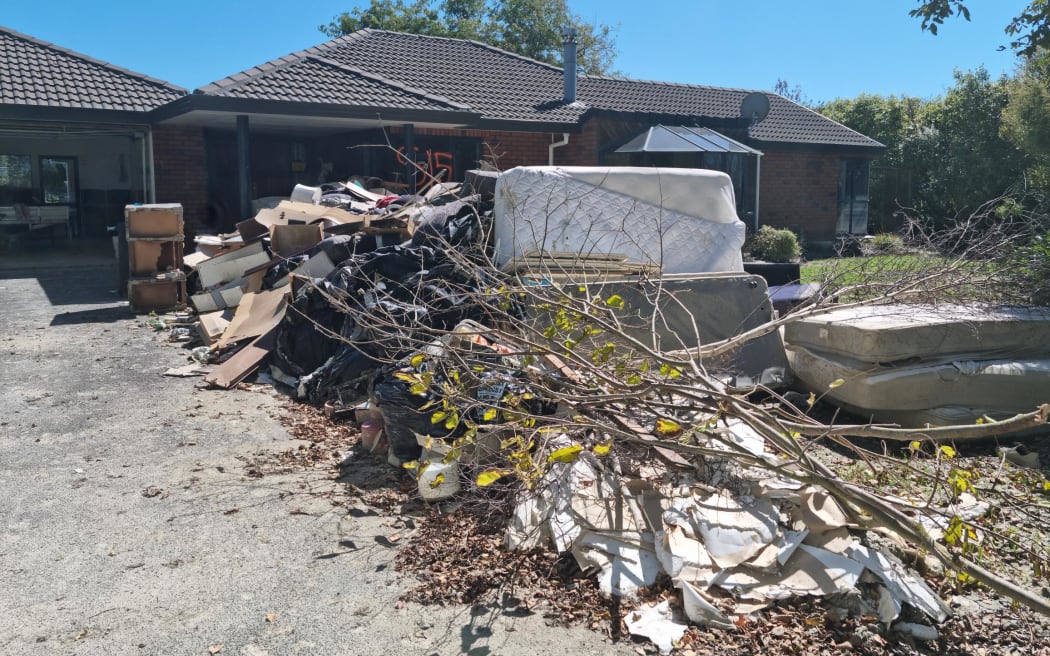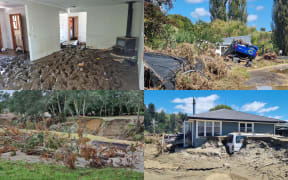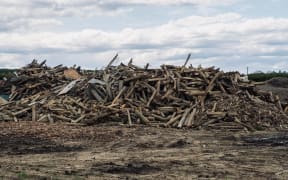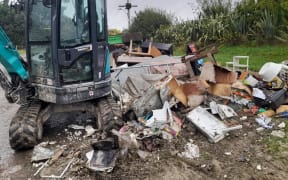
Destroyed household items In Awatoto, Napier, after cyclone Gabrielle swept through the region. Photo: RNZ / Niva Chittock
A new study shows people are still suffering adverse health effects from Cyclone Gabrielle 12 months on.
The revelation comes as a public health expert calls for a national inquiry into the impacts of the cyclone, almost a year on from New Zealand's costliest storm on record.
The cyclone - which cost an estimated $14.5 billion - killed 11 people, displaced more than 10,500, and caused a range of acute and long-term health effects.
The Long Shadow of Cyclone Gabrielle: Brief Review at 12 months has found many are still suffering ongoing disruption to lives and stress from housing damage.
"The latest data from MBIE shows 469 houses have been red stickered due to the extreme weather indicating they are inhabitable. Another nearly 2500 have been yellow stickered meaning they are effectively unusable. The disruption and lack of closure for many people is likely to be having ongoing mental health impacts," said author Professor Nick Wilson from the University of Otago, Wellington.

Professor Nick Wilson Photo: RNZ Insight / John Gerritsen
The report also highlighted the ongoing disruption to lives from infrastructure damage, with some roads and bridges yet to be repaired.
It further found persistent economic damage from farmland and tourism sites, with farmland sites unusable due to silt and debris, while tourism sites that drew in visitors remained closed.
Wilson said the damage wrought by Gabrielle revealed the country's lack of resilient infrastructure, including to health-critical water supply and sewage disposal systems.
"Even post-cyclone repairs have lacked resiliency," he said. "For example, we have seen repaired roading breaking up and a temporary $200,000 causeway getting washed away after only 25 days."
Wilson said there needed to be a comprehensive government funded review into the impacts and responses of Cyclone Gabrielle.
He told Midday Report: "A national level inquiry should probably be routine for all very costly disasters and Cyclone Gabrielle exceeds this threshold. More generally, central and local government needs to do far more to increase the resiliency of infrastructure. Similarly for supporting managed retreat of those living in housing that is particularly vulnerable to flooding, slips and sea level rise."
"Although we knew the very large impacts of Cyclone Gabrielle at the time, it's important to realise that it does have a long shadow in terms of ongoing impacts."
He said that could be seen in the disruption to people's lives from the housing damage, the ongoing disruption with persistent infrastructure damage to roads and bridges, and ongoing economic impacts from traffic disruption, damaged farmland and closed tourism sites.
"So we're really calling on the government to say ... it's time for a full inquiry of the impacts and response.
"For this scale of disaster, New Zealand's largest weather related disaster to date, it's really imperative to have an inquiry."






